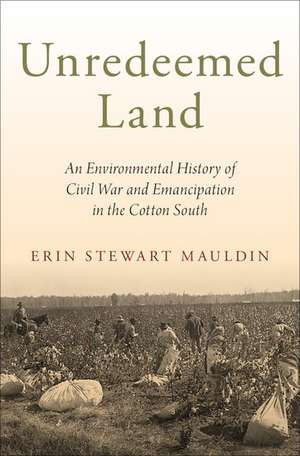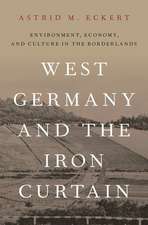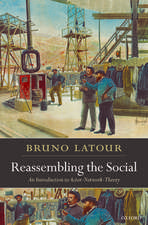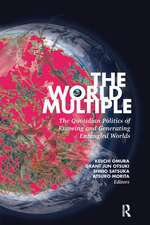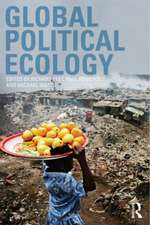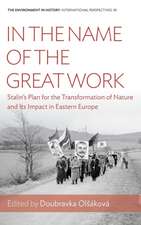Unredeemed Land: An Environmental History of Civil War and Emancipation in the Cotton South
Autor Erin Stewart Mauldinen Limba Engleză Hardback – 29 noi 2018
| Toate formatele și edițiile | Preț | Express |
|---|---|---|
| Paperback (1) | 157.26 lei 10-16 zile | +38.66 lei 4-10 zile |
| Oxford University Press – 4 apr 2022 | 157.26 lei 10-16 zile | +38.66 lei 4-10 zile |
| Hardback (1) | 396.93 lei 31-37 zile | |
| Oxford University Press – 29 noi 2018 | 396.93 lei 31-37 zile |
Preț: 396.93 lei
Preț vechi: 520.26 lei
-24% Nou
Puncte Express: 595
Preț estimativ în valută:
75.98€ • 82.56$ • 63.86£
75.98€ • 82.56$ • 63.86£
Carte tipărită la comandă
Livrare economică 10-16 aprilie
Preluare comenzi: 021 569.72.76
Specificații
ISBN-13: 9780190865177
ISBN-10: 0190865172
Pagini: 256
Ilustrații: 17 hts
Dimensiuni: 236 x 157 x 25 mm
Greutate: 0.6 kg
Editura: Oxford University Press
Colecția OUP USA
Locul publicării:New York, United States
ISBN-10: 0190865172
Pagini: 256
Ilustrații: 17 hts
Dimensiuni: 236 x 157 x 25 mm
Greutate: 0.6 kg
Editura: Oxford University Press
Colecția OUP USA
Locul publicării:New York, United States
Recenzii
Mauldin's well-researched book investigates the fascinating story of land in the Cotton South and how it was farmed in the years from 1840 to the 1880s, offering a new agricultural and environmental history of the Civil War and emancipation.... Unredeemed Land argue[s] for the vibrant possibilities of analyzing the environmental impacts of the Civil War—and other major conflicts—on the daily life and material futures of communities and individuals.
In Unredeemed Land, Mauldin has written a thoughtful and engaging examination of southern environmental history stretching from the antebellum era through the Civil War and into Reconstruction. Unredeemed Land illuminates a frequently neglected area of study. Mauldin also demonstrates that policies promoting environmental protection need not be limited to affluent nations operating under strong economic conditions. Denizens who ignore sustainable environmental practices do so at their peril.
Erin Stewart Mauldin has written a succinct and insightful analysis of southern agriculture that explodes old myths and offers new explanations by taking an environmentally holistic view of the subject...This brief but incisive book will be of interest to anyone who wants to understand how the Old South attempted to become the New South, with all the attendant challenges and setbacks of such a fundamental adjustment. It adroitly explains why such a transition was wrought with failures and limitations.
Unredeemed Land is a welcome intervention in Civil War and Reconstruction historiography, demonstrating the critical role of environmental fragility in rural Southern life ... an impressive piece of scholarship
In Unredeemed Land, Mauldin has written a thoughtful and engaging examination of southern environmental history stretching from the antebellum era through the Civil War and into Reconstruction. So many histories of the era focus on political, military, and socioeconomic events, and rightly so. Yet in reading these sweeping histories, there is a tendency to think that ordinary citizens reflected on the monumental issues of the daywhen, in fact, most people worried far more about earning a living and feeding their families. Byexamin[ing] the factors that affected the day-to-day lives of farmers,Unredeemed Landilluminates a frequently neglected area of study. Mauldin also demonstrates that policies promoting environmental protection need not be limited to affluent nations operating under strong economic conditions.
Unredeemed Land adds an important new chapter to the expanding historiography of southern environmental history. Mauldin's work goes far in helping to explain why southern farmers and planters would have embraced a postwar system of intensive cotton production that proved to be so detrimental to the land and its people ... [The book] serves as an important introduction to the American Civil War's devastating ecological legacy.
Mauldin should be applauded for the amount of primary research she did. By utilizing a number of letters and journals, she provides a human element to the story of economic and environmental change. Mauldin also deserves credit for writing a highly readable book about a complex subject. Even when dealing with subjects such as ecology and socioeconomic factors of the time period, the writing and sources make for a fascinating read.
[Amidst] the sesquicentennial of the Civil War ... Mauldin still found fresh soil to till ... in considering the impact of the war on land usage. ... She does a commendable job humanizing a potentially dry topic; her prose is lively, and she combines personalized accounts and moving journal entries with obligatory census data and government records. ... Essential.
In Unredeemed Land, Mauldin has written a thoughtful and engaging examination of southern environmental history stretching from the antebellum era through the Civil War and into Reconstruction. Unredeemed Land illuminates a frequently neglected area of study. Mauldin also demonstrates that policies promoting environmental protection need not be limited to affluent nations operating under strong economic conditions. Denizens who ignore sustainable environmental practices do so at their peril.
Erin Stewart Mauldin has written a succinct and insightful analysis of southern agriculture that explodes old myths and offers new explanations by taking an environmentally holistic view of the subject...This brief but incisive book will be of interest to anyone who wants to understand how the Old South attempted to become the New South, with all the attendant challenges and setbacks of such a fundamental adjustment. It adroitly explains why such a transition was wrought with failures and limitations.
Unredeemed Land is a welcome intervention in Civil War and Reconstruction historiography, demonstrating the critical role of environmental fragility in rural Southern life ... an impressive piece of scholarship
In Unredeemed Land, Mauldin has written a thoughtful and engaging examination of southern environmental history stretching from the antebellum era through the Civil War and into Reconstruction. So many histories of the era focus on political, military, and socioeconomic events, and rightly so. Yet in reading these sweeping histories, there is a tendency to think that ordinary citizens reflected on the monumental issues of the daywhen, in fact, most people worried far more about earning a living and feeding their families. Byexamin[ing] the factors that affected the day-to-day lives of farmers,Unredeemed Landilluminates a frequently neglected area of study. Mauldin also demonstrates that policies promoting environmental protection need not be limited to affluent nations operating under strong economic conditions.
Unredeemed Land adds an important new chapter to the expanding historiography of southern environmental history. Mauldin's work goes far in helping to explain why southern farmers and planters would have embraced a postwar system of intensive cotton production that proved to be so detrimental to the land and its people ... [The book] serves as an important introduction to the American Civil War's devastating ecological legacy.
Mauldin should be applauded for the amount of primary research she did. By utilizing a number of letters and journals, she provides a human element to the story of economic and environmental change. Mauldin also deserves credit for writing a highly readable book about a complex subject. Even when dealing with subjects such as ecology and socioeconomic factors of the time period, the writing and sources make for a fascinating read.
[Amidst] the sesquicentennial of the Civil War ... Mauldin still found fresh soil to till ... in considering the impact of the war on land usage. ... She does a commendable job humanizing a potentially dry topic; her prose is lively, and she combines personalized accounts and moving journal entries with obligatory census data and government records. ... Essential.
Notă biografică
Erin Stewart Mauldin is an Assistant Professor of History at the University of South Florida, St. Petersburg. She is the co-editor of A Companion to Global Environmental History.
